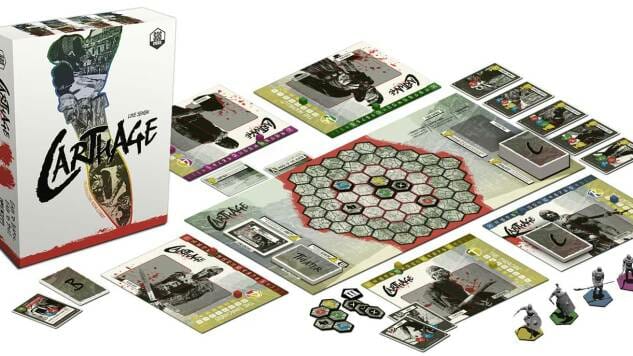The Board Game Carthage Doesn’t Offer the Player Enough Control
Art courtesy of SAS Creative Games Reviews board games
Carthage takes the deckbuilding mechanic popularized by Dominion and turns it into a game of mortal combat on a hexagonal board, played out over multiple rounds where players get the opportunity to upgrade their decks as the game progresses and do more damage to opponents or incorporate new tactics. It’s a clever twist on what has become a hackneyed core ruleset, and really ramps up the interactivity of this style of deckbuilders, although it doesn’t give players enough control over how they build those decks.
Players in Carthage each start with similar decks of ten cards, and draw five for each round. Each player will play all five of those cards, which allow for movement, damage, adding hit points (‘armor’), or gaining ‘favor’ points from the audience that can be used to purchase cards at the end of the round. The cards in the starter decks are, unsurprisingly, fairly weak, so you’re sort of slapping each other back and forth without doing a lot of lasting damage. The cards that you buy are more powerful, some slightly so and some extremely so, including cards that introduce the possibility of tactical moves through sequential benefits—for example, move one space, hit an adjacent opponent for damage, then move three spaces (i.e., run away!), maybe even hit another opponent for damage.
The battle arena is hexagonal and comprises a bunch of hexagonal spaces, with an outer ring and an inner, smaller hexagon, with the two sections coming into play in certain scenarios. In each round of battle, the players draw a new Theater card that changes one or more rules for that specific round, such as one that says players can’t cross the boundary between the outer ring and the inner one, or cards that give all players extra Favor points or dings each player a hit point. The base game also comes with many scenarios to alter game play, from different setups to the introduction of non-player Beasts that also fight in the same arena, causing confusion and delay for the various players.
Since you’re going to play all five of your cards in each round, the primary decision you’ll make during those turns is the order in which to play them. Each player begins the game (in the basic setup) with 15 armor (hit points), and there are many cards in the deck that will restore one or more points, with a maximum of 20. There’s also one tile on the board in the base game that gives one armor back to the first player to step on it during that round, as well as similar tiles for damage, movement, and favor. Because the starter deck cards do so little damage, the early rounds end up a lot of lose a point, regain a point, and just try to stay near 15 until the round ends.
The crux of the game is in the favor points, however, and early in the game players will largely rack up similar amounts of these points and have little discretion over how much effort to put into that versus actual combat. At the end of the round, the players can choose from five cards out on display for purchase with favor points; each player can buy one card, in turn, and then players can buy remaining cards once every player has had a chance to buy, if they have favor points left. Players can also spend a favor point to become the start player, or spend three favor points to trash a card from their decks (the Focus option), which can help streamline a deck the way the Chapel card does in Dominion so that your more valuable cards come up more frequently. There’s also a Theater card that allows all players to Focus one card in that round.
The game’s early stages feel too perfunctory, as everyone has similar cards and there isn’t any tactic that can give one player much advantage in any aspect other than drawing a lucky set of cards. Carthage doesn’t click into gear until players have started to build out their decks with new purchases, and that’s where some strategy can make a difference in results on the board. Players are eliminated once their Armor scores drop to zero, which is unusual for Euro-style games, and there’s a tremendous amount of luck involved in Carthage because you can only purchase from the cards on display at the end of any round, and you don’t have a ton of control over how much Favor you acquire (it doesn’t carry over from round to round) or when you’ll get to make your purchases. The idea of a Dominion-style game of direct combat and fights to the death has a lot of appeal, but I’d prefer an implementation that gave players more control over the decks they build.
Keith Law is a senior baseball writer for ESPN.com and an analyst on ESPN’s Baseball Tonight. You can read his baseball content at search.espn.go.com/keith-law and his personal blog the dish, covering games, literature, and more, at meadowparty.com/blog.
